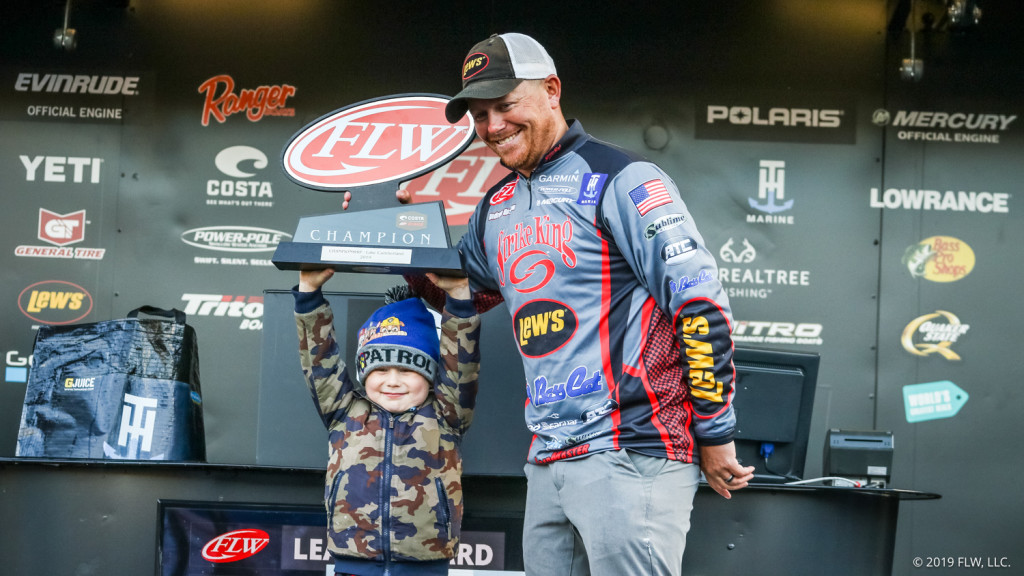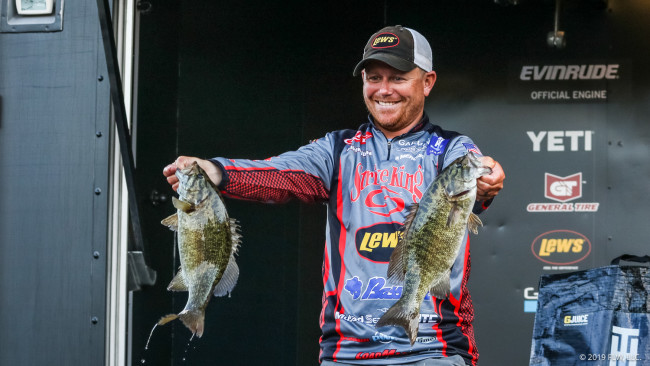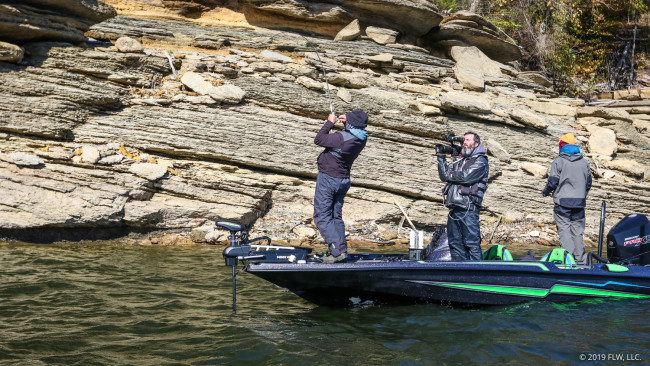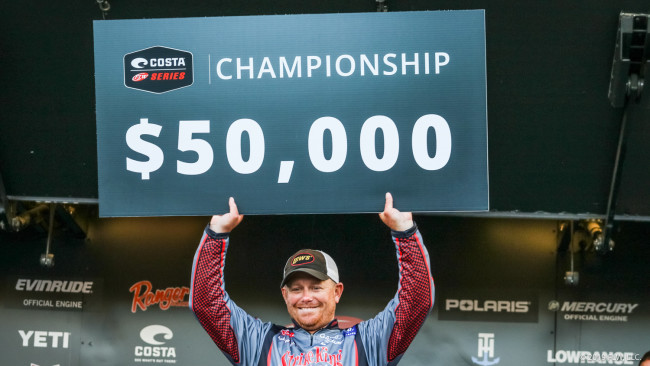Upshaw Closes on Cumberland
Oklahoma pro wins 2019 Costa FLW Series Championship in style

He did it again.
For the second time this season, Andrew Upshaw is an FLW champion thanks to consistent days spent targeting big Southern smallmouths. The Tulsa, Okla., pro won the 2019 Costa FLW Series Championship on Lake Cumberland in Burnside, Ky., with a three-day total weight of 42 pounds, 15 ounces. The win comes less than seven months after Upshaw won the FLW Tour event on Cherokee Lake in east Tennessee.
“I’m just going to call it blind luck,” says Upshaw about his recent string of success on smallmouth fisheries. “And I’m glad to have it, to be honest with you.”
Upshaw calls it luck, but his recent performances say otherwise. He’s actually a smallmouth fanatic, and it showed this week.
“For the duration of my Tour career, we’ve fished enough smallmouth fisheries that I’ve kind of learned how they set up and stuff like that,” he says. “The other thing is, one of my favorite places to fish in the country is Lake St. Clair and Lake Erie. I really love catching smallmouth up there. Now, they set up totally different up there, but that love for smallmouth drives me to learn how to catch them in other places.”
Like up north, the smallmouths down here are aggressive fish. Upshaw had that in mind as he formulated a game plan. He knew that if he was going to win with smallmouths, he needed to find a pattern that would get him a lot of bites. Cumberland is full of fish, so if he wasn’t getting bit consistently, he wasn’t on a program that could win.

He eventually found the right stuff down on the reservoir’s lower end.
“What I figured out was main-lake transition bluffs, but it had to have the river channel swing on it – true river-channel swings,” Upshaw says.
The best transitions started at 45 to 50 feet deep adjacent to the wall and shallowed up to 22 to 24 feet deep.
“Right where it started slightly flattening out, that’s where they’d be sitting,” Upshaw says. “I had about 15 spots, from about Conley Bottom down. Some of them didn’t ever fire like they did in practice, and some did better than they did in practice.”
Upshaw figures a lot of these fish are already in or near their wintertime holes. Some might eventually shift over to the deeper water near the bluffs, but others will stay put. More fish were transitioning into these areas during the tournament, which meant he had new bass coming to him. He was on so many fish that, yesterday, Upshaw actually left them biting after multiple culls for ounces. He was consistently on more fish than his fellow competitors, and by getting more bites, he eventually was able to assemble limits of the quality fish needed to win.
To get bit, Upshaw sometimes used a Ned rig, which is what he caught most of his winning fish on at Cherokee in April, but he caught most of his bass on a classic Cumberland bait: a jig.
He rigged the Ned rig with a Strike King Ned Ocho Wormin green pumpkin on a 1/8-ounce Gene Larew Ned Rig Pighead Jig Head. His jig was either a 3/8- or 1/2-ounce Strike King Bitsy Flip Jig, which has a bigger hook than the standard Bitsy Bug. He paired it with a green pumpkin Strike King Baby Rage Craw.
“The first day, they’d eat it on the drop,” Upshaw says of the jig. “As soon as you flipped it up there, it just swam off with it. They were right up on the bank. Yesterday, they kind of shifted out a little bit, and today they were even deeper. I still caught two up there real shallow, but I had to drag it even farther to get bites today. I was just slowly dragging it down there.

“I was fishing the jig anywhere between 5 and 14 feet. I was flipping it. Basically, I’d let it free-fall on slack line, and that’s when I’d know if they ate it on the fall. And I let it just gradually fall on the bottom down the bluff. I let it fall and feathered it all the way down.”
The jig bite was a “timing deal,” says Upshaw. The fish really weren’t up on the bluffs in the first hour or two in the morning. The first day, in the rain and wind, he spent the opening hour or so throwing a buzzbait, but after that, he simply fished the jig and hoped to get a bonus bite or two before the better smallies finally moved up.
The timing factor was probably a benefit for Upshaw more than anyone else today, since a two-hour fog delay held up takeoff. Many of the top 10 pros reported a strong morning bite, but they didn’t get there in time today. The short day really hurt them. Upshaw’s fish fired like clockwork.
“Typically, bluff bites, for me, they just don’t eat early,” he adds. “I’ve never caught them early. I know other guys do, but I don’t.
“The timing deal, when they really bite on those bluffs, is anywhere between 10 o’clock and about 3. Then, as the sun goes down, they stop biting on them. I don’t know what they do; they just don’t bite.”
Nevertheless, Upshaw knew enough to pocket the $52,000 winner’s check. It goes nicely with the $100,000 he won back in the spring. Smallmouths, it seems, pay off nicely for the Oklahoma pro.

Top 10 Pros
1. Andrew Upshaw – Tulsa, Okla. – 42-15 (15) – $52,500
2. Rob Burns – Plano, Texas – 41-5 (15) – $25,200
3. Matt Pangrac – Broken Arrow, Okla. – 38-6 (14) – $20,100
4. Luke Plunkett – Pinson, Ala. – 36-9 (15) – $15,000
5. Travis Manson – Conshohocken, Pa. – 35-1 (14) – $10,000
6. Rusty Salewske – Alpine, Ca. – 33-10 (13) – $8,000
7. Laramy Strickland – Bushnell, Fla. – 31-6 (11) – $7,000
8. Steve Floyd – Leesburg, Ohio – 30-6 (13) – $8,000
9. Brent Algeo – Ozark, Mo. – 28-7 (12) – $5,000
10. David Valdivia – Norwalk, Calif. – 24-1 (9) – $4,500